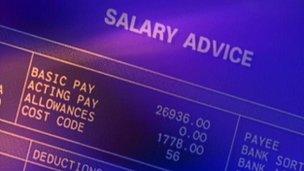Tax and benefits: Time for a financial spring clean
- Published

Family finances will be affected by a number of changes at the start of the new tax year
When the dust settles on a number of changes to family finances over the weekend, it may prove to be a perfect time for a financial spring clean.
The Money Advice Service, an education body funded by the financial services industry, says that the new tax year is a perfect time to make a fresh start with money.
"You may be surprised to find ways to free up some extra cash and make savings for the year ahead," a spokeswoman for the service says.
The advice comes as the new financial year marks a host of changes to the level of benefits, taxes and pensions, all of which have been announced in Chancellor George Osborne's Budget speeches and autumn statements.
They range from an alteration to the first chunk of income that is tax-free - known as the personal allowance - to the annual upgrading of benefits, as well as government cuts coming into force.
Some have been welcomed, but others have proved controversial.
"Millions of people will be getting a small boost from the personal allowance increase, but working families are likely to have lost far more from cuts to tax credits," says Brendan Barber, general secretary of the TUC.
Benefits
A whole host of benefits, externalare increasing at the turn of the new financial year on 6 April.

Maternity pay is one of the benefits that is rising on 6 April
They are automatically rising in line with the inflation rate the previous September - so this time that will be the Consumer Prices Index measure of inflation last September of 5.2%.
The idea is that the amount paid in benefits is not eroded by the rising cost of living.
The benefits that are linked in this way include jobseeker's allowance, income support, disability benefits, maternity benefits, and incapacity benefit.
So, for example,Carer's Allowance, externalrises from £55.55 to 58.45 a week. Meanwhile, the standard rate of statutory maternity pay goes up from £128.73 to £135.45.
There are also some changes to the entitlement rules forEmployment and Support Allowance, external, the successor to Incapacity Benefit.
Tax credits
There are a whole host ofchanges to the tax credits system, administered by HM Revenue and Customs (HMRC). In part, these changes are the result of the government's austerity drive.
The key change is that, other than a fewexceptions, couples with children will have to work for 24 hours a week between them, not 16, in order to qualify for working tax credit. One member of the couple will have to work for at least 16 hours a week.
"We have urged HMRC to write to people affected by this change to make them fully aware of all of the exceptions and the need to contact HMRC," says Victoria Todd, of the Low Incomes Tax Reform Group.
The child element of childtax credits, externalrises by £135 on 6 April. The child element is an amount paid to support lower-income families depending on the number of children in a family, in addition to child benefit.
But the couple and lone-parent elements of working tax credit stay the same as the last financial year. These parts of the tax credit system are paid to working, low-income couples or lone parents in addition to a basic tax credit payment.
Tax
The personal allowance is the amount of income you can receive without paying tax on it.

Workers' payslips will look a little different because of the changes to the personal allowance
For people aged under 65, the allowance rises by £630 on 6 April to £8,105 for the 2012-13 tax year. So everyone who is earning more than this amount will benefit from this extra tax-free allowance.
However, the upper threshold of the basic rate falls by £630 to £34,370. This means a few people whose total taxable income is just below the previous threshold of £35,000 will be taxed at the higher rate of 40% on the top £630 of their taxable income from April.
For 65- to 74-year-olds, the personal allowance rises from £9,940 to £10,500. For 75-year-olds and over, the allowance rises from £10,090 to £10,660. This extra amount is gradually withdrawn from those with a taxable income between £24,000 and £29,000.
There is a gradual withdrawal of the personal allowance for everyone, regardless of age, with income above £100,000.
The first £325,000 of inheritance when somebody dies is exempt from inheritance tax, a level that remains unchanged.
But now, the rate of inheritance tax for amounts over £325,000 will be cut from 40% to 36% for estates that leave 10% or more to charity.
Changes to the way non-domiciles are taxed takes effect on 6 April.
Meanwhile, for savers, the Individual Savings Account (Isa) allowance rises to £11,280. Up to £5,640 of this can be saved in cash with one Isa provider. The remainder can be invested in stocks and shares with either the same or a different Isa provider.
Pensions
The full basic state pension will rise by £5.30 to £107.45 a week, from 9 April - three days after many of the other tax and benefit changes.

Various calculators are available for people to make changes to their weekly budget
Pension Credit, which ensures that pensioners reach a guaranteed minimum income level, also rises in line with the government's triple-guarantee system which means that state pensions always rise by the greater of average earnings, prices, or 2.5%.
So this increases by 3.9% to £142.70 a week for single pensioners. For pensioner couples, it will rise by the same proportion to £217.90 a week.
The Savings Credit element tops up the state pension by up to £20.52 a week if pensioners have saved a modest amount. But many are receiving letters telling them that this is being reduced by several pounds a week.
The maximum payment will fall to £18.54 on 9 April and other rules have been changed to reduce the value of the credit.
How to spring clean
The Money Advice Service suggests that everyone sets aside some time to review their finances, and now is a good time to do it.
One of the initial tasks should be to check the rates of interest on savings and loans, to see if a better option is available elsewhere. For example, an introductory rate may have expired on a savings product, which means the interest received may have dropped sharply.
Calculators and planners on theservice's website, externalallow people to come up with an action plan, work out how long it will take to pay off debts, or draw up a personal budget plan for the year.